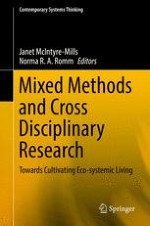
2019 | OriginalPaper | Buchkapitel
1. Summary and Key Themes: We Are the Land and the Waters
verfasst von : Janet McIntyre-Mills
Erschienen in: Mixed Methods and Cross Disciplinary Research
Verlag: Springer International Publishing
Aktivieren Sie unsere intelligente Suche, um passende Fachinhalte oder Patente zu finden.
Wählen Sie Textabschnitte aus um mit Künstlicher Intelligenz passenden Patente zu finden. powered by
Markieren Sie Textabschnitte, um KI-gestützt weitere passende Inhalte zu finden. powered by